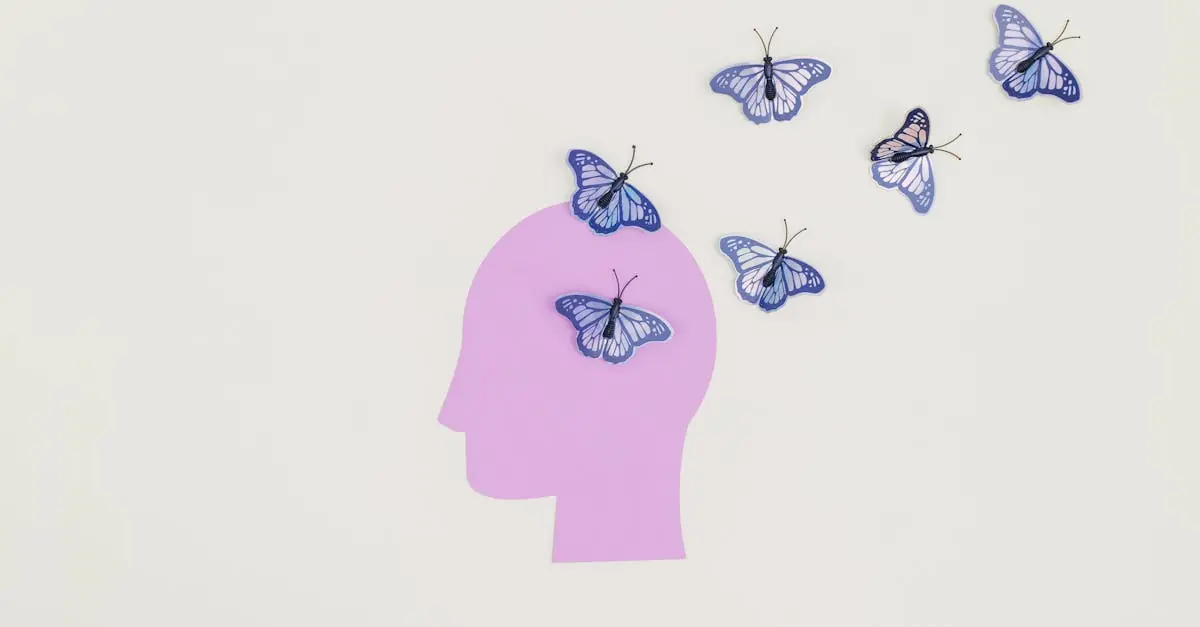Table of Contents
ToggleIn a world where stress levels soar higher than a cat on a caffeine buzz, mental transformation isn’t just a luxury—it’s a necessity. Imagine waking up each day feeling like a superhero, ready to tackle whatever life throws at you. This guide is your trusty sidekick on that journey, packed with insights and strategies that’ll have you flipping negativity on its head faster than you can say “mind over matter.”
Understanding Mental Transformation
Mental transformation involves a fundamental shift in one’s mindset, fostering growth and resilience. This process plays a crucial role in enhancing individuals’ overall mental well-being.
What Is Mental Transformation?
Mental transformation refers to changing thought patterns and emotional responses. Individuals engage in this process by adopting new perspectives and habits, which allows them to develop a more positive outlook. Techniques like mindfulness practices or cognitive restructuring can facilitate these changes. Over time, these adjustments lead to improved emotional regulation and better decision-making.
Importance of Mental Transformation
Mental transformation proves essential in navigating today’s challenges. Individuals embracing this shift often experience increased stress management abilities and enhanced emotional intelligence. Studies indicate that adaptable mindsets correlate with greater resilience against adversity. Furthermore, cultivating self-awareness establishes a strong foundation for personal and professional growth.
Key Components of a Mental Transformation Guide
A comprehensive mental transformation guide includes various techniques and strategies pivotal to achieving lasting change. Understanding key components enhances the journey toward mental well-being.
Setting Goals for Transformation
Goals serve as a roadmap for individuals embarking on a mental transformation. Specific goals clarify direction and make tracking progress easier. Individuals can set achievable milestones, ensuring steady movement towards their desired state of mind. Prioritizing these goals helps maintain focus amidst daily distractions. Continuous evaluation of progress fosters motivation and allows for necessary adjustments. Celebrating small victories reinforces commitment and boosts self-esteem. Utilizing measurable criteria makes it easier to recognize accomplishments throughout the transformation process.
Mindfulness and Awareness Techniques
Mindfulness forms the foundation of mental transformation by promoting present-moment awareness. Practicing mindfulness helps individuals become more attuned to thoughts and emotions, facilitating better emotional regulation. Techniques such as body scans and breath awareness anchor attention and permit greater clarity. Cultivating self-awareness through regular reflection enables deeper understanding of one’s reactions and habits. Daily mindfulness exercises enhance resilience against stressors, reducing anxiety and promoting overall well-being. Engaging in meditation supports concentration and offers a pathway to cultivate a more positive mindset.
Steps to Implement the Guide
Implementing a mental transformation guide involves structured steps that encourage positive change. Setting specific, achievable goals starts the process, creating a clear roadmap for progress.
Developing a Positive Mindset
Cultivating a positive mindset forms the foundation for mental transformation. Practicing gratitude daily shifts focus from negativity to appreciation, promoting a greater sense of well-being. Engaging in positive affirmations reaffirms personal strengths and capabilities. Visualization techniques also empower individuals to imagine successful outcomes, reinforcing self-belief. Surrounding oneself with supportive people enhances encouragement and fosters a constructive environment. Regularly challenging negative thoughts with facts fosters resilience and promotes mental clarity.
Overcoming Mental Barriers
Identifying and overcoming mental barriers unlocks personal potential. Recognizing limiting beliefs allows individuals to address and modify their thought patterns. Seeking support from mentors or coaches provides guidance and fresh perspectives. Creating a safe space for vulnerability encourages open dialogue about fears and doubts. Techniques such as cognitive restructuring enable individuals to replace negative thoughts with positive alternatives. Engaging in stress-reduction activities improves focus and reduces anxiety, facilitating clearer thinking and enhanced problem-solving skills.
Tools and Resources
Exploring available tools and resources makes the journey of mental transformation more effective. Each resource supports individual progress, contributing to overall mental well-being.
Recommended Books and Apps
Books like “Mindset: The New Psychology of Success” by Carol S. Dweck and “The Power of Now” by Eckhart Tolle offer insightful strategies for mindset shifts. Apps such as Headspace or Calm provide guided meditations, promoting mindfulness and emotional regulation. These resources enhance self-awareness while helping individuals cultivate a positive mindset. Integrating these tools into daily routines strengthens commitment to personal growth.
Support Systems for Your Journey
Surrounding oneself with a supportive network fosters resilience. Friends, family, or mentors can provide encouragement and accountability. Joining support groups or engaging in online communities can also offer shared experiences and strategies. Seeking professional help from counselors or coaches may enhance personal development. These connections not only mitigate feelings of isolation but also strengthen determination in overcoming challenges.
Embracing mental transformation opens the door to a life filled with confidence and resilience. By adopting new perspectives and habits individuals can break free from negativity and enhance their overall well-being. Setting specific goals acts as a guiding light on this journey while mindfulness practices foster emotional regulation and self-awareness.
The tools and resources highlighted serve as valuable companions in this process. Surrounding oneself with supportive networks further strengthens resilience and commitment. Ultimately, mental transformation is not just a goal but a continuous journey toward unlocking personal potential and thriving in today’s fast-paced world.







